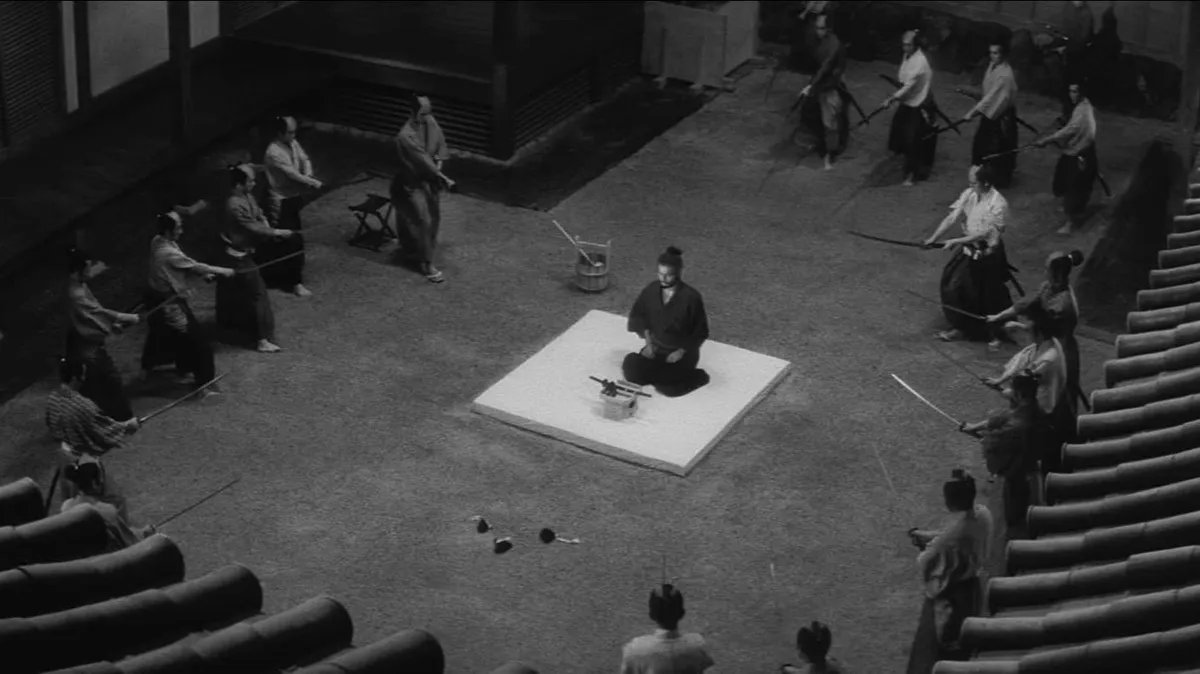Harakiri: Honour Killed The Samurai

I’m a hip-hop head. I’ve loved it for as long as I can remember and one of my favourite albums of all time is Honor Killed The Samurai by KA. He passed away last year but left an incredible legacy in underground, New York rap that spanned decades.
The first track of said album, ‘Conflicted’, samples much more than just the sparse soundtrack of today’s film; it draws inspiration from the themes of Harakiri and places them in a context that is far removed from 1600s Japan.
That is the power of Masaki Kobayashi’s masterpiece.
As the number one rated narrative feature on Letterboxd its been in the back of mind for a while. I was sceptical of its quality; my contrarian tendencies flare up whenever there’s a consensus around any piece of art.
But there is no doubt in my mind that it is a worthy contender for such an honour.
Tsugumo Hanshirō (Tatsuya Nakadai) is a ronin who arrives at a compound of the Iyi clan; a noble samurai house famed for their martial prowess and adherence to the social codes of their class. He requests use of their courtyard to commit harakiri; the ceremonial act of suicide taken when a samurai no longer has a master.
The clan are wary of Tsugumo; an influx of ronin attempting to extort noble houses, including a certain Chijiiwa Motome (Akira Ishihama), has led them to be cautious of such requests.
Saitō Kageyu (Rentarō Mikuni), the clan’s counsellor, relays the story of Motome’s cowardice when forced to perform harakiri in front of retainers of the Iyi clan; in accordance with the strict samurai code.
What follows is a gripping narrative of poverty, desperation and inhumanity that questions the fabric of Japanese society and leaves no one unscathed.
Everybody should watch this film at least once.
It is without question one of the greatest films I have ever seen. Small in scale yet epic in its themes, Kobayashi examines the cruelty and hypocrisy that occurs when rigid adherence to honour is demanded by authority.
This is a lean film. There’s not a scene, shot or line of dialogue to be trimmed in the entirety of its two-hour runtime. Everything is essential.
Every frame is a near-perfect composition, enhancing and drawing into focus the central themes. Genius uses of symbolism highlight the contrast between men’s words and their actions.
Nakadai’s performance is otherworldly. The toil of a deep, philosophical battle in Tsugumo’s soul is displayed with complexity and passion.
That complexity is mirrored in a genius plot, which moves from past to present like a duel. Kobayashi parries each narrative with another revelation, slicing our assumptions in two.
It builds into a devastating finale that shatters the anxious atmosphere and transforms it into a brutal takedown of the concept of honour and reputation.
Underpinning it all is a sparse, caustic score that centres itself on tense silences. Traditional Japanese instrumentation is used to highlight moments that make a mockery of the severe social contract under which everybody must live.
KA, also known as Kaseem Ryan, didn’t just sample this haunting score when he made his album. He took from Harakiri its central thesis of the inhumanity authority must use to control those it rules.
This speaks to the enduring power of Masaki Kobayashi’s seminal work. The timelessness and universality that attracted a young artist from across the globe to its story. KA said it best with the title of said album.
Honour killed the samurai.
Enjoy? Why not Subscribe via email to keep up to date. Follow me on Bluesky or Letterboxd. If you're feeling generous, consider throwing me a few quid on Ko-fi.